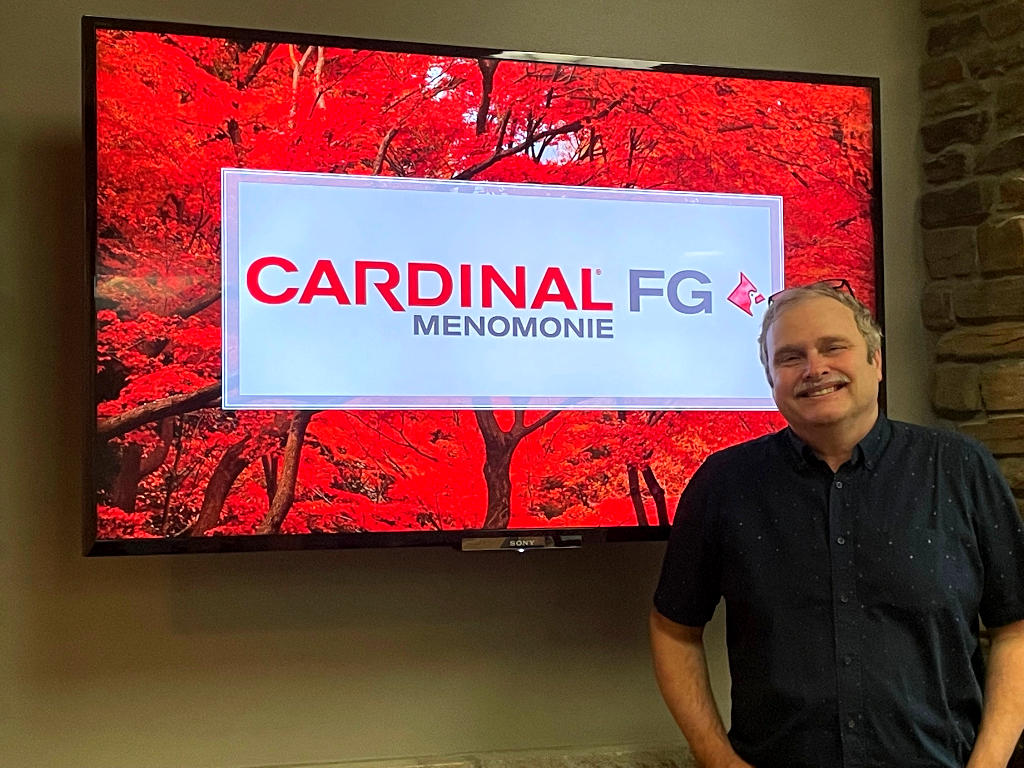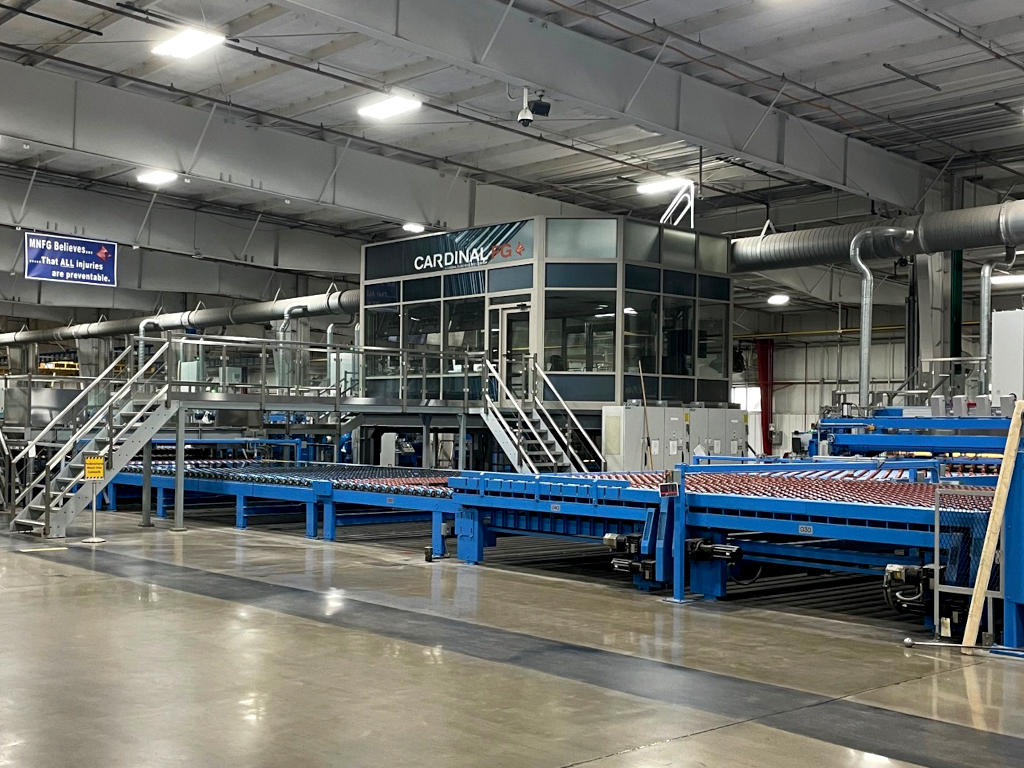People-focused
“A second rewarding aspect of being a Technical Manager is training a young engineer for years and seeing that person grow, then possibly being promoted in the technical field or maybe going to production or maybe getting a job that person has always dreamed of,” confides Mr Renberg. “Getting a younger person fresh to the glass industry to truly ‘understand’ what’s going on within a few years and seeing that mindset begin to couple with their intellect is very satisfying to me. Whenever one of these young engineers in my department tells me that I’ve helped them, in whatever ways, it makes me feel like I have done my job for the future of not only glass, but the overall professional job market as well.”
Across all of its operations, Cardinal FG invests in its workforce and the Menomonie Vision Statement “says it all”, believes Mr Renberg, underlining how ‘Our employees are the key to our continued success’. In addition to supporting workers and their families (‘an important support base for our employees’), Cardinal MNFG is also an active member of the community, donating to several local organisations as well as being a member of the Menomonie Chamber of Commerce.
Corporate support for Cardinal’s float glass division was launched in 2008. “A small group of personnel visits each float plant two to three times a year for a Continuous Improvement meeting where any and all issues, concerns, etc. are aired-out for feedback, next plan of attacks and who to possibl[y] consult for help,” reveals Mr Renberg. “Also, twice a year, all the float glass plants visit and are represented in a technical meeting rotating between the plants. This opportunity gives everyone a chance to hear the successes and challenges of each float glass plant first hand and most importantly, to put a face with a name and actually get to know who people are in each plant. Everything is discussed from defect issues, glass chemistry consistency between plants, schedule for big furnace repair project needed assistance from other float glass plants and so on. We even have guest speakers from vendors, industry experts or someone, say from the coating division of the company, to give the float glass people a deeper understanding of an entirely different aspect of Cardinal. It’s really great.”
Strategic investment
An on-going issue that Cardinal and other glass companies continue to tackle is the “need to get more out of their furnaces to stay financially solvent,” cautions Mr Renberg. “Although stones, bubbles, seeds, ream still look the same as they did 36 years ago, the issues that are now creating these traditional defects are sometimes very different and can be very challenging.”
Cardinal is “very open-minded” to innovative improvements regarding longer furnace life while improving fuel efficiency, he notes. “Refractory changes in not only better materials but better designs have been incorporated such as a different type of melter/refiner crown to promote radiation back to the glass melt/glass bath and improving/changing tin bath flux block compositions in certain areas of the tin bath to give us a fighting chance to reach the 20-year mark for a furnace/tin bath.”
According to Mr Renberg, Cardinal FG will be the first and only float glass company in the USA to operate all of its plants as a minor source [a manufacturing facility site that does not qualify as a major source of harmful emissions], something that it is doing “in a voluntary fashion and not because of a consent decree,” he stresses. “These environmental initiatives came at a cumulative cost of over $70M with monthly costs in the neighbourhood of $100k to maintain the minor source status at each facility. Changing the environmental status of a float plant from a major source to a minor source is a big deal as all constituent emissions must now be below the 250tpa [tons per annum] threshold.”
Sustainability initiatives
Monitoring rapidly-evolving changes to the energy developments within the USA and globally, Cardinal is taking a “bold” role with its sustainability and environmental evolutions, says Mr Renberg. “Cardinal FG has hydrogen facilities scheduled to be installed at each FG facility for the tin bath operations,” he reports. “Cardinal also has dual nitrogen/oxygen-generation facilities at several other float glass sites.”
Other sustainability initiatives include returnable metal racks to reduce landfill waste, using cullet not only generated within the plant but also receiving >10% back from the customer through responsible cullet return, down to smaller programmes such as reusing a large percentage of packaging materials.
“There has been a long history of training our affiliates with not only how different cullet compositions aren’t always compatible, but also the cleanliness of the cullet is ultra-important,” adds Mr Renberg. “The little topic of nickel sulphide stones is of special importance which makes it even more paramount for proper communication and zero tolerance for questionable cullet to be put in the furnace.”
Cardinal is currently participating in an industry-wide hydrogen consortium to develop combustion systems that support the high-profile decarbonisation effort within the entire glass industry. “Through reducing emissions with Scrubber/SCR systems and being a part of the future with more environmentally friendly combustion technology, Cardinal is a terrific example of environmental responsibility,” believes Mr Renberg. “Also, it should be noted that Cardinal not only produces glass in an environmentally responsible manner, but produces products that are more energy efficient as well. The Cardinal CG group continues to improve coatings to further enhance energy efficient windows in lieu of the ever-evolving energy codes. Cardinal has proudly developed products that meet and exceed the ENERGY STAR Version 7.0 product specification.”
Hotbels / GPC participation
Presenting at the Hotbels glass industry seminar for suppliers and glassmakers in April 2022, as well as the Glass Problems Conference last autumn, Mr Renberg explained how Cardinal FG’s Durant plant used its SCR calcium-based waste product as a batch ingredient, successfully co-ordinating the incorporation of calcium sulphate in tandem with the sodium sulphate in the batch, reportedly saving ~$150k per year in landfill costs and with no adverse effects to the glass quality.
“Another great example (also presented by yours truly at the GPC and Hotbels) is the Zero Waste Water Discharge facility the Winlock plant that was successfully built (properly termed a Reclaimed Water Treatment Plant),” adds Mr Renberg. “Approximately 650,000 gallons of water for cooling the scrubber is reclaimed in this closed loop system.”
The motivation to attend the Hotbels conference was two-fold, he reveals: “One, to tell the ‘Green Story of Cardinal FG’ and that terrific environmental accomplishments can be achieved when you get a proper plan, backing and execution, and two: speaking for myself, it was my pleasure to present this at the GPC and Hotbels for Cardinal as it was just something I could do to say ‘thank you’ for bringing me along for the ride back in 2015.
“It goes without saying that I will certainly support and attend future events, even present again."
“When you are a speaker, people tend to remember you, which is really great when trying to expand one’s network of people,” he continues. “I wholeheartedly encourage people to attend future GPC and Hotbels events as, to me, [they] are without doubt two of the best glass-making [conference] venues in the United States.”
Can flat glass continue to be a green material of choice in the long term? Yes, according to Mr Renberg: “Glass has a very bright future from my perspective [...] It is my belief that the general population will be more and more engaged to recycle as time goes on, and since glass is inorganic, [it] means no carbon will be released from itself when recycled. Glass is, therefore in itself, another perfect ‘Green Story’.”



